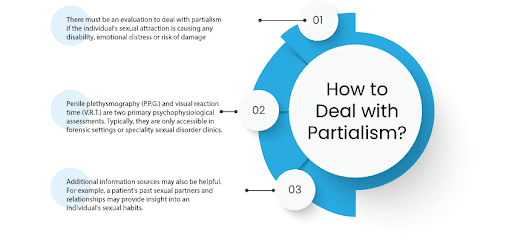Introduction
Partialism[1] is a sexual interest in a specific body part, including hair, buttocks, and breasts. The most prevalent kind of partialism is podophilia, in which a person feels sexually aroused by feet.
People with partialism find themselves drawn to the other erogenous body parts of people they are attracted to rather than genitals. They are more commonly physically attracted to random body parts, including feet, legs, hands, nose, ears, eyes, etc. Foot fetish, also known as podophilia, is a kind of partialism.
More About the Concept of Partialism
There is a difference between partialism and fetishism. Arousal by a non-living object is fetishism. Partialism is a kind of paraphilia, i.e., recurrent, persistent, and intense interest in atypical things, situations, or activities. What causes partialism or how to treat it is unknown, and treatments rarely work. Partialism being considered a paraphilia is highly-debated and controversial.
A person is said to have an unusual sexual disorder if they experience discomfort or impairment due to their partialism or if the fulfilment of their paraphilia[3] results in personal harm or the potential of damage to others. Clinical intervention might not be necessary if there is no distress, loss, or risk of actual injury associated with sexual attraction.
Some forms of partialism are illegal in some societies. Partialism is a form of paraphilia that is more a desire for sex or preference rather than a problem linked with paraphilia. Usually, adults who have attained the age of sexual consent do not think engaging in such behaviour is wrong. Paraphilia and the distinction between normal conduct and abnormal or disordered behaviour are highly debated topics.
Why Is Partialism More Common Than You Think?
Partialism[2] is a sexual attraction that focuses exclusively on a body part other than the genitals. The Diagnostic and Statistical Manual (DSM-5) classifies partialism as a fetishistic disorder only when it causes substantial psychosocial distress to the individual or hurts significant aspects of their life.
Individuals who display partialism will sometimes characterise the anatomical features that attract them as having the same or higher level of erotic appeal than the genitals. Partialism affects heterosexuals, bisexuals, and homosexuals. Usually, people consider foot fetishism one of the most widespread forms of partialism.
Only when these tendencies cause discomfort for you or another person or cause harm to them can we consider them to be flaws of partialism? It is not regarded as unhealthy if it does not harm others, such as children, and does not impact one’s capacity to perform at home, work, or other aspects of life.
Hence, partialism is not a problem if it lacks psychological impact, i.e.:
- Causes doubts about your sexual inclination
- Causes injury, distress, or even death to someone else due to the desire for or participation in sex
- Involves unlawful sexual curiosity
What Impact Does Partialism Have?
Numerous psychological hypotheses regarding the development of partialism are more common. Some people think these abnormalities are signs of slow psychological growth and that partialism is a way to defend against distress.
- The impact of partialism may include attention to the point of absurdity, which may interfere with the individual’s intellectual capacity concerning other activities or cause problems while participating in more conventional sexual activities with a suitable-aged partner.
- People with a paraphilia may experience anxiety or depression temporarily allayed when they engage in paraphilic activity. It can develop into an addictive cycle.
- The level of sexual interest might be distressingly overwhelming.
- There will be a lack of consistent self-awareness, problems controlling emotions, and dependence on others.
- People who have been abused sexually or in other ways, especially during childhood, may identify with their abusers to the point where they hurt others the same way they were.
- By adolescence, most people have a good idea of what makes them sexually satisfied. People who grow up in homes that are either too sexually indulgent or too sexually frustrated are more likely to develop paraphilia.
What Are the Side Effects of Partialism?
- The practitioner of the deviation may or may not consider their partialism a condition or an issue in their own life; however, it is detrimental either way. If individuals know they have a problem but do not seek treatment, they may risk themselves and others.
- Social ostracism kills them. Coming out with a sexual fetish that is not publicly acceptable might result in various reactions. For example, after a provocation, people may attack or isolate someone due to their unusual characteristics.
- Persistent humiliation can drive them deeper into partialism. Feelings of shame and regret cannot prevent sexual perversion. Instead, it can cause obscurity in both men and women.
- It is a common occurrence that a suffering person may not fully understand what would be wrong with having unpleasant sexual behavioural patterns and fantasies. There are no complications if desires are contained within the mind or fulfilled by a willing partner.
- Difficulties expressing oneself can lead to suicidal thoughts. To adhere to societal conventions, a person may restrain their desires, and this long-term compromise can cause depression and suicide.
How to Deal with Partialism?
People with unusual sexual interests or sexual behaviours that cause problems rarely go to a psychiatrist to be evaluated and treated. Some people might fear being judged or embarrassed, while others might fear the legal consequences of revealing their sexual fantasies or behaviours to a mandated reporter. They do not see the need to alter their sexual attitudes and behaviours since they are unaware of their therapeutic choices.
The following are ways to deal with partialism:
- There must be an evaluation to deal with partialism if the individual’s sexual attraction is causing any disability, emotional distress or risk of damage.
- Penile plethysmography (P.P.G.) and visual reaction time (V.R.T.) are two primary psychophysiological assessments. Typically, they are only accessible in forensic settings or speciality sexual disorder clinics.
- Additional information sources may also be helpful. For example, a patient’s past sexual partners and relationships may provide insight into an individual’s sexual habits.
Conclusion
Partialism is not what most people consider the norm in society. However, it is not unhealthy as long as consenting adults practise it. Sensible to talk to a medical professional if you have concerns about sexual orientation or believe it is causing problems in any aspect of your life or other people’s lives. Your doctor will connect you with a mental health expert specialising in paraphilic disorders.
| [1] | Collinsdictionary.com. [Online]. Available:
https://www.collinsdictionary.com/dictionary/english/partialism. [Accessed: 15-Feb-2023]. |
| [2] | A. Santos-Longhurst, “Partialism: What is it and is it ‘healthy?'” Healthline, 17-Oct-2018. [Online]. Available: https://www.healthline.com/health/partialism. [Accessed: 15-Feb-2023]. |
| [3] | P. de Silva, “Paraphilias,” Psychiatry (Abingdon), vol. 6, no. 3, pp. 130–134, 2007. |










